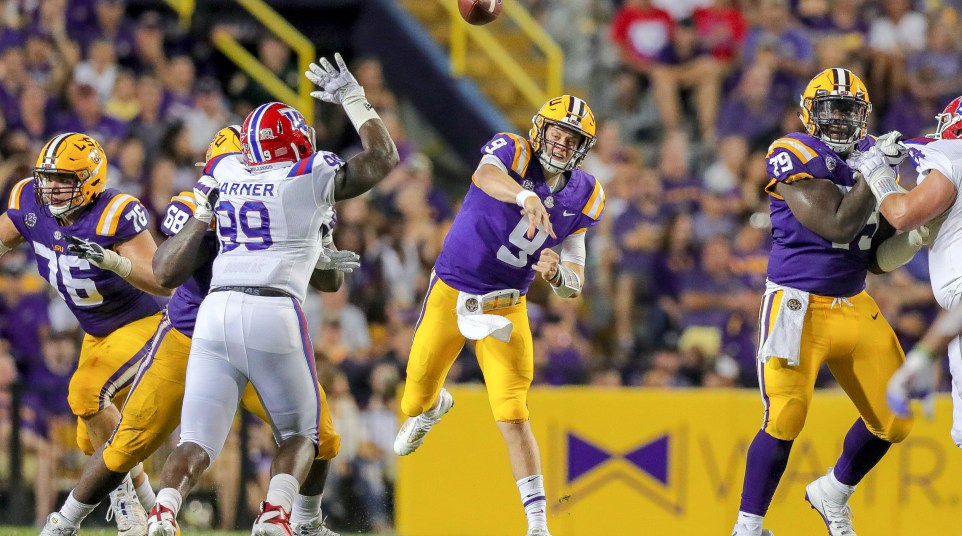
LSU football: Time is running out for passing game to come together
The crowd in Tiger Stadium finally saw the crisp, productive, entertaining passing game it had been waiting to see.
Unfortunately for them, it was provided by Louisiana Tech and not LSU.
The Bulldogs passed for 330 yards as they threw a scare into the No. 6 Tigers before LSU turned a shaky three-point fourth-quarter lead into 38-21 final margin that belied just how competitive Saturday’s game was.
Yes, Tech had to throw 50 passes to gain that many yards, and 22 went incomplete and one was intercepted.
Nonetheless, the Bulldogs had more success moving the ball on LSU’s defense than any of the Tigers’ previous three opponents – including top 10 foes Miami and Auburn – did. In fact, the 417 total yards were the third most allowed by LSU in third-year coordinator Dave Aranda’s tenure.
So should Tech’s success passing the ball, which led the way as the Bulldogs came from a 24-0 deficit to a 24-21 threat early in the fourth quarter, be a concern going forward? Well, it’s certainly going to get the attention of Aranda and head coach Ed Orgeron.
Keep in mind, though, that Tech’s average of 6.6 yards per pass was far from spectacular and even less than LSU’s 6.8 average.

Credit: Stephen Lew-USA TODAY Sports
The Bulldogs passed and passed and passed because they had to in order to get back into the game. By the time they started clicking, LSU had forced two turnovers and built a 24-0 lead. Orgeron and Aranda started shuttling in backups, and defensive lineman Rashard Lawrence and safety Grant Delpit were forced from the game by health issues.
The Tigers defense will be fine, but when will the home team be the one that provides the crispness, productivity and entertainment from the passing game?
LSU is 4-0, and Joe Burrow has rightly received praise for his leadership, decision-making and accuracy. But to date, the Tigers’ passing game has been little more than adequate, and it still has a ways to go if LSU is going to maintain its top 10 ranking.
The Tigers passed for just 191 yards as Burrow completed 16 of 28 passes Saturday. Though he lost a fumble while being sacked late in the second quarter for the Tigers’ first turnover of the season, he had his fourth consecutive interception-free game.
The modest passing yardage was sufficient because LSU ran the ball so well. Clyde Edwards-Helaire had 136 yards and 2 touchdowns on 20 carries, and Nick Brossette had 78 yards and 3 touchdowns on 23 carries.
If the Tigers are going to rush for more than 200 yards and average 4.5 yards per carry, as they did against Tech, they can continue to wait on the breakout performance from the passing game – but not for long.
LSU gets Ole Miss next week, then comes the SEC gauntlet of Florida, Georgia, Mississippi State and Alabama in consecutive games.
At some point in October, Burrow is going to have to be more than a game manager, and the passing game is going to have to be more than it has been.
The Tigers can’t contend in the SEC West simply by riding the defense and complementing it with kicker Cole Tracy, a nice running game and a turnover-free passing game.
Now, the defense and Tracy can give LSU a chance in any game as long as the offense pulls its weight.
It looks like Brossette and Edwards-Helaire are forming a solid tandem behind an offensive line that keeps evolving despite needing a revolving door.
Dee Anderson, Derrick Dillon and Justin Jefferson have shown signs as emerging as consistent playmakers, and other receivers have had moments.
Now it’s time for Burrow and the receivers to put it all together.
Tech had one standout receiver Saturday as Adrian Hardy caught 10 passes, including 2 of the Bulldogs’ 3 touchdown receptions, for 181 yards. And eight other Bulldogs caught passes as well.
LSU doesn’t want to throw the ball 50 times, and it doesn’t necessarily need to involve nine receivers or even pass for 330 yards.
But it has passed for 200 yards in just one game, the victory at Auburn, and in that game 71 of the 249 passing yards came on one game-turning completion from Burrow to Dillon.
Sooner rather than later, the passing game is going to have to become more consistently productive.
